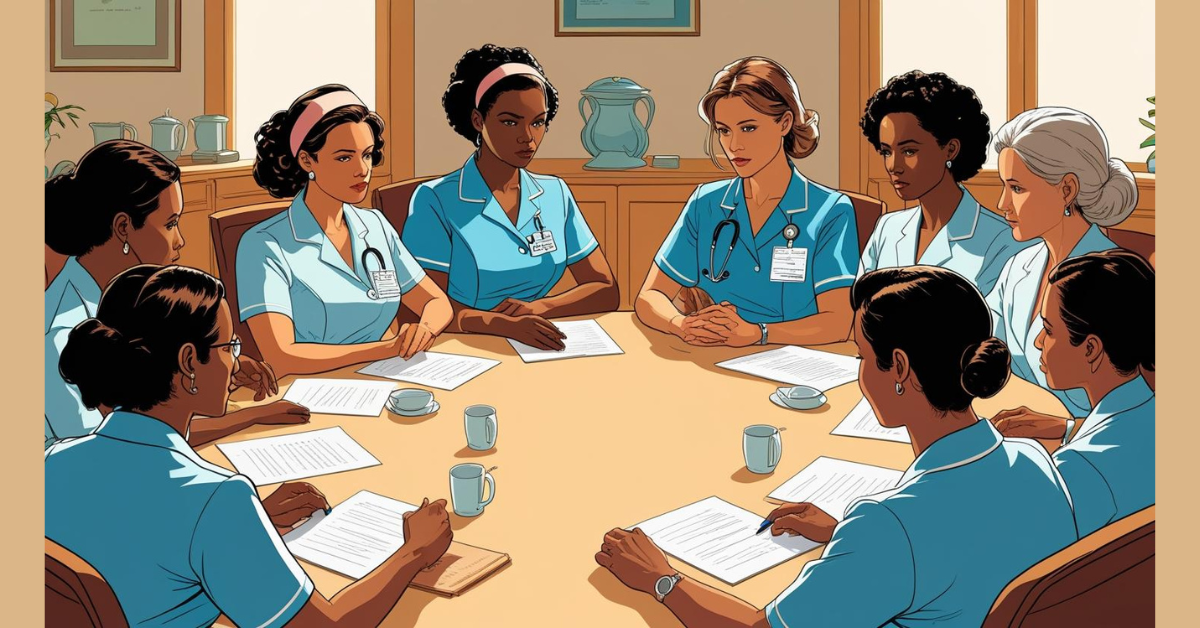What are Ethical Dilemmas Decision Making and Committees In Nursing Practices. When nurses understand common ethical dilemmas in nursing, utilize ethical decision-making frameworks, and seek the support of ethics committees, they can address these challenges with greater confidence and competence and ultimately maintain the highest standards of patient care.
The Ethical Dilemmas Decision Making and Committees In Nursing Practices
Ethical dilemmas in nursing practice arise when nurses face situations that involve conflicting moral values or principles and require careful decision-making. These dilemmas often involve balancing patient autonomy, beneficence (doing good), non-maleficence (avoiding harm), and justice. Ethical decision-making frameworks and panels can guide nurses in navigating these difficult situations.
Ethical Dilemmas in Nursing
Patient Autonomy VS Beneficence/Non-maleficence
Nurses often face situations in which a patient’s wishes (e.g., refusing treatment) conflict with what they consider medically best or safest. This requires careful consideration of the patient’s capacity to make informed decisions and the potential consequences of their decisions.
Informed Consent
It is critical that patients understand the risks, benefits, and alternatives of a treatment before making a decision. However, obtaining truly informed consent can be complex, especially in vulnerable or time-pressed populations.
Resource Allocation
Limited resources, such as beds, staff, or medications, can create ethical dilemmas when deciding who receives care and which treatments are prioritized. Nursing staff must make these decisions fairly and ethically, often under pressure.
Confidentiality
Maintaining patient privacy and confidentiality is critical. However, there may be situations where confidentiality needs to be broken to protect patients or others (for example, when reporting suspected child abuse).
End-of-Life Decisions
Nursing staff may face difficult decisions regarding palliative care, pain management, and the withdrawal or withholding of life-sustaining treatments, often in the context of complex family dynamics and cultural beliefs.
Truthfulness and Deception
Balancing the need to be honest with patients and their families against the potential for causing harm or distress can be challenging.
Professional Boundaries
Maintaining appropriate professional boundaries with patients and their families is essential for ethical conduct. This includes avoiding duplicative relationships and maintaining professional conduct.
Ethical Dilemmas
An ethical dilemma occurs when obligations, principles, rights, values, and beliefs are in conflict. When ethical dilemmas arise, there is not a clear-cut right or wrong solution. When faced with an ethical dilemma, a nurse must make a choice between or among two or more equally undesirable alternatives. Once a choice has been made, the nurse may continue to believe that neither choice was morally preferable. Moral uncertainty results when a nurse senses there is a moral problem but he or she is not sure of the morally correct action or what moral principles apply (Jameton, 1984).
When a nurse experiences moral uncertainty, he or she is uncomfortable about the situation but cannot explain why. Moral distress results when a nurse knows the right action to take to solve a moral problem but cannot follow his or her moral beliefs because of organizational constraints. Moral distress involves a threat to one’s moral integrity (Epstein & Delgado, 2010). Factors contributing to moral distress stem from a nurse’s personal traits and experiences, the work environment, and external influences such as third party expectations (Burston & Tuckett, 2012).
Further, the research supports that moral distress can contribute to a decreased quality of care, patient satisfaction, and nurse satisfaction. The American Association of Critical-Care Nurses (2008) suggests that moral distress is a critical and frequently ignored problem today. It can restrict a nurse’s ability to provide optimal care and experience job satisfaction. Nurse leaders and managers must be vigilant to identify situations that may result in ethical dilemmas and be prepared to advocate for staff experiencing moral distress.
Additionally, nurse leaders and managers must be proactive and seek to implement programs to address moral distress and promote creating healthy work environments. When a nurse experiences moral distress, he or she may consider speaking out. Overcoming the fear associated with speaking up takes courage, specifically moral courage. Moral courage requires a steadfast commitment to fundamental moral principles despite potential risks (Murray, 2010).
A morally courageous nurse is pre pared to confront unethical situations despite the negative consequences, such as emotional anxiety, shame, threats to reputation, horizontal violence, and even job loss (LaSala & Bjarnason, 2010; Murray, 2010). Examples of nurses using moral courage include reporting a colleague who is diverting drugs, questioning a health care provider about an order that is not within a reasonable standard of care, con fronting a manager about inadequate staffing, and reporting a peer for posting patient information on a social media site (Butts & Rich, 2013). Nurse leaders and managers should do their best to create and sustain work environments that promote moral courage.
Ethical Decision Making
A nurse’s values and beliefs influence the way he or she approaches and solves ethical dilemmas. There are numerous ethical decision-making models in the nursing literature, many of which are similar. Regardless of the framework or model, ethical decision making should be holistic and begin with gathering all the facts. It is critical to think through the issue, feel empathetic toward all persons involved, and avoid knee jerk reactions. There are four key aspects of ethical decision making (Cooper, 2012, p. 608):
- Identifying an ethical problem and gathering relevant facts
- Considering all involved in terms of impact, views, and opinions
- Identifying possible options, and choosing and justifying an option
- Implementing the decision The ANA has published numerous position statements and guidelines to assist nurses dealing with ethical decisions in everyday practice.
Nurses at all levels often encounter situations in practice that require them to make decisions in collaboration with others involved in the situation, such as patients, families, other nurses, and other health-care professionals.
Ethics Committees
In the early 1990s, The Joint Commission (TJC) recognized the need for a mechanism to address ethical issues in health-care organizations and established a standard for accreditation. Since then, health-care organizations seeking accreditation or maintaining accreditation must address ethical issues through an ethics consultation service. Typically, inter-professional committees or teams provide ethics consultation services when ethical dilemmas arise during the delivery of care. Ethics committees in organizations have three interrelated functions:
1) institutional policy review and development,
2) ethics education, and
3) case consultation (Lachman, 2010).
Most ethics committees are responsible for developing and reviewing policies and procedures, such as those relating to informed consent, advance directives, and withholding or withdrawing life support measures. Ethics education is an ongoing process among committee members and throughout an organization. Education for committee members is accomplished through invitation of expert guest speakers, sharing of article and case reviews, and sharing of knowledge by other members that were gleaned from ethics workshops/conferences (Lachman, 2010).
Organization-wide education occurs through ethics workshops and conferences. The nature of ethics committees is inter-professional; nurse leaders and managers frequently participate on ethics committees. A common service provided by an ethics committee is consultation to address ethical issues related to current clinical situations. The goals of consultation include intervening to protect patient rights, making recommendations to resolve ethical conflicts, providing moral support for those involved in an ethical situation, and reducing the risk of legal liability.
The bedside nurse, health-care provider, family member, health-care surrogate, or patient can request an ethics consultation. In fact, anyone can refer a situation to the ethics committee for review. As part of patient-centered care, nurses must understand that conflict can arise between the patient’s wishes and professional care. In some cases, requesting an ethics consultation can require a nurse to be morally courageous. Nurse leaders and managers must empower patients and nurses to foster a patient centered approach to ethical decision making.
Read More:
https://nurseseducator.com/didactic-and-dialectic-teaching-rationale-for-team-based-learning/
https://nurseseducator.com/high-fidelity-simulation-use-in-nursing-education/
First NCLEX Exam Center In Pakistan From Lahore (Mall of Lahore) to the Global Nursing
Categories of Journals: W, X, Y and Z Category Journal In Nursing Education
AI in Healthcare Content Creation: A Double-Edged Sword and Scary
Social Links:
https://www.facebook.com/nurseseducator/
https://www.instagram.com/nurseseducator/
https://www.pinterest.com/NursesEducator/
https://www.linkedin.com/in/nurseseducator/
https://www.researchgate.net/profile/Afza-Lal-Din
https://scholar.google.com/citations?hl=en&user=F0XY9vQAAAAJ


